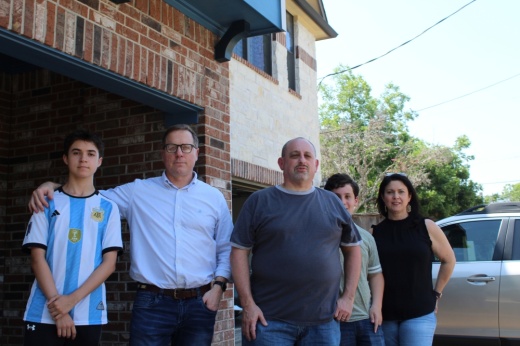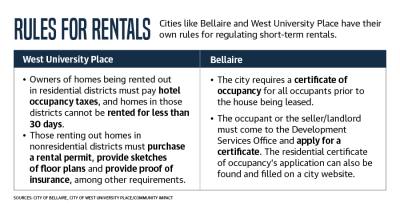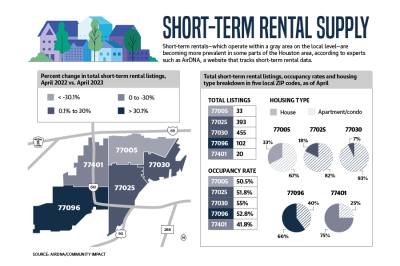Jason Ginsburg is a Montrose resident who lives near the proposed site of Bria Place, the first STR property being developed by former football player Darryl Sharpton through his hospitality brand, The Sharpton.
Ginsburg argues that larger STRs adjacent to residential properties go against a city ordinance on hotels which states that hotels with 50 rooms or less cannot abut a residential property on any side. Residents such as Ginsburg who have spoken with Community Impact want the city to update its code to incorporate STRs and are frustrated with what they said is a lack of action so far.
“Our group’s position is that all short-term rentals that adjoin residential properties in the city of Houston—which I feel like would be the vast majority of them—should not be allowed to operate under the section of the city code,” Ginsburg said.
City leaders, including District C Council Member Abbie Kamin, are listening to residents’ concerns as the city looks at regulating STRs.
“Many district residents rent out as an additional (and often needed) source of income. It’s a great economic booster for our city, and it’s that property owner’s right,” Kamin said in a statement texted to Community Impact. “At the same time, we have to have some parameters in place with companies to ensure renters participate safely.”
Defining short-term rentals
The city of Houston defines a hotel as any building or buildings in which the public may obtain transient sleeping accommodations and defines STRs as residential dwellings rented out for less than 30 consecutive days.
According to data from AirDNA, a site which tracks STR data, there are 10,050 listings for entire properties in the city of Houston, compared to 1,003 for five core ZIP codes making up the Bellaire, Meyerland and West University areas. The lion’s share of those listings, a total of 455, can be found in the 77030 ZIP code, which covers the Texas Medical Center and parts of the Museum District.
Some residents living among these STRs have brought their concerns to the local government, including the city of Bellaire.
The last time a proposed ordinance regarding STRs was presented to Bellaire City Council was in May 2021. Council Members Catherine Lewis and Jim Hotze proposed a minimum six-month term for rental or leases of single-family homes. In the council agenda packet at the time, Hotze and Lewis listed traffic, nuisance violations, littering and “general disrespect for our Bellaire neighbors” among concerns.
Ultimately, the city’s decision to propose an ordinance on the matter was postponed. As of 2023, Bellaire does not have a specific ordinance prohibiting or regulating STRs, according to city officials. Instead, Bellaire only requires property owners who rent out their space to complete a certificate of occupancy, city officials said.
As Bellaire city officials work to complete the city’s 2024 comprehensive plan, some residents have voiced their dismay with STRs, which they said disrupt Bellaire’s moniker as a “City of Homes.”
Meanwhile, after the city of Houston’s Regulatory and Neighborhood Affairs Committee discussed STRs at a March 23 meeting, the two council members heading the committee—Chair Sallie Alcorn and Vice Chair Amy Peck—sent a memo to Mayor Sylvester Turner. In it, the council members asked the mayor to look more closely at short-term rentals citywide, specifically mentioning the Museum Place Apartments, a 24-unit apartment complex in Houston’s Museum District with units listed on STR sites.
“Neighbors complained of street takeovers, loud noise, unruly behavior, drug use, garbage being left behind, unmanageable parties in the units and at the communal pool, damage to the nearby park, and suspected trafficking,” Alcorn and Peck’s memo said. “The property has been on Airbnb’s radar given the complaints submitted by neighbors and council members.”
The city is exploring its legal options regarding STRS, which could include developing regulations for rental properties operating as hotels, said Billy Rudolph, chief of staff for Houston’s Office of Administrative and Regulatory Affairs.
In West University Place, city leaders adopted an ordinance in 2018 that made it illegal for properties in residential districts to be rented for less than 30 days. Apartment owners in the city have multiple steps to complete to rent in nonresidential districts, including purchasing a rental permit, providing sketches of the floor plan and providing proof of insurance. They must also pay hotel occupancy taxes.
Neighboring conflict
Mac Hoak has been a resident of his Museum District home for over a decade. Almost two years ago, the Museum Place Apartments were sold to husband-and-wife duo Thawda and Sara Aung, and the property began operating as a de facto STR hotel, Hoak said.
“I’m an Airbnb host as well; we have a little cottage that we rent out,” he said. “And I think it’s a great resource for people and for people to make some money.”
The problem, Hoak said, is that despite operating like a hotel, the 24-unit apartment complex has no front desk or real-time monitoring of guests.
“This is a hotel that’s unlicensed, unregulated. And the owner, despite saying all the right things and making efforts, is not able to manage it properly, safely,” Hoak said. “That’s why we have all banded together as a neighborhood to just say, this is not good for our city.”
The Aungs list the units at Museum Place Apartments for between approximately $70 to $110 per night. Residents have asked them to raise these rates to change the type of clientele who rent here.
In a series of statements texted to Community Impact, Thawda Aung said his guests are usually seeking treatment at the Texas Medical Center, and units are priced with that in mind.
“Our guests have reported the reason they book with us [is that] cancer treatment is hard, but it’s even harder without home-cooked meals,” he said. “We felt it was a central location to continue to service this demographic, and we price our units with this client in mind. Many of these individuals are facing high medical costs.”
Thawda Aung denied any illegal activity occurring at his property and said he and his wife “use the strictest standards for vetting guests.”
Hoak said he put up a temporary fence to shield his property from the activity at Museum Place Apartments.
“If I just don’t see it, maybe it won’t make me so anxious,” he said.
An official at Airbnb—the largest provider of STRs in Houston at 67%, according to AirDNA— said the company is doing all it can to prevent these issues citywide.
“The vast majority of hosts in Houston are responsible neighbors who share just one home to help supplement their income and make ends meet,” said Luis Briones, a public policy manager at Airbnb, in an emailed statement to Community Impact. “We look forward to continuing to partner with the city of Houston to address community concerns and to ensure hosts are sharing their homes responsibly.”
Resolutions for rentals
Matt Curtis, the founder of Smart City Policy Group—a policy research and advisory group focused on local governments—said it will be crucial for Houston officials to understand the trends and data surrounding STRs in the city before moving forward with any regulatory changes. Requiring STR operators to register with the city would be a good start, he said.
“I think that creating a fair registration program that allows people to gain access to operate STRs is a great place to start because it gives the city the ability to remove the registrant if somebody is proving to be a bad actor and [has] consistent nuisance issues,” Curtis said.
While the city mulls over a solution, residents of these neighborhoods with burgeoning STR properties are stuck in limbo.
“It’s a hotel, in a residential neighborhood, much less it’s adjacent to the Post Oak School,” Hoak said of Museum Place Apartments. “So, I worry about these kids.”
Shawn Arrajj and Melissa Enaje contributed to this report.







